

ISP liability for 1/3 party content. Chilling Effects Clearinghouse. Does Clicking 'I Agree' Create a Binding Contract? Companies selling products over the internet should review their website layouts to ensure they conform to the "fair and forthright" standard.
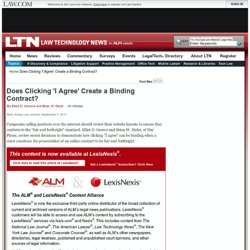
Elliot D. Osrove and Brian W. Disler, of Day Pitney, review recent decisions to demonstrate how clicking "I agree" can be binding when a court construes the presentation of an online contract to be fair and forthright. The ALM ® and LexisNexis ® Content Alliance LexisNexis ® is now the exclusive third party online distributor of the broad collection of current and archived versions of ALM’s legal news publications. ALM’s content plays a significant role in your work and research, and now through this alliance LexisNexis ® will bring you access to an even more comprehensive collection of legal content.
If you are not currently a LexisNexis subscriber, contact 1-800-227-4908 to find out more or click here to have a customer representative contact you directly . OECD on the Role of Internet Intermediaries in Advancing Public Policy Objectives. Part II, The Role of Internet Intermediaries in Advancing Public Policy Objectives, examines the roles and responsibilities of Internet intermediaries in advancing public policy objectives, as well as the costs and benefits of their involvement through a series of case studies.
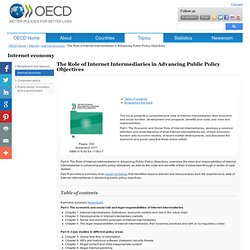
Part III provides a summary of an expert workshop that identified lessons learned and best practices from the experience to date of Internet intermediaries in advancing public policy objectives. Table of contents Executive summary (download) Part I: The economic and social role and legal responsibilities of Internet intermediaries Chapter 1. Part II: Case studies in different policy areas Chapter 5. Part III: June 2010 OECD Workshop on “The Role of Internet Intermediaries in Advancing Public Policy Objectives” Chapter 12. Annex A. How to obtain this publication Readers can access the book choosing from the following options: Related Documents. Collateral Censorship and the Limits of Intermediary Immunity by Felix Wu. Yeshiva University - Benjamin N.
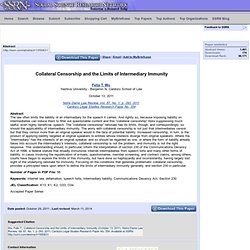
Cardozo School of Law October 13, 2011 Notre Dame Law Review, Vol. 87, No. 1, p. 293, 2011 Cardozo Legal Studies Research Paper No. 354 Abstract: The law often limits the liability of an intermediary for the speech it carries. And rightly so, because imposing liability on intermediaries can induce them to filter out questionable content and this “collateral censorship” risks suppressing much lawful, even highly beneficial, speech. EU Public Consultation. Electronic commerce constitutes an important means to promote cross-border trade, improving the accessibility of Europe’s population to more varied products, to more qualitative products, and exerting greater price competition in the on-line and off-line world.
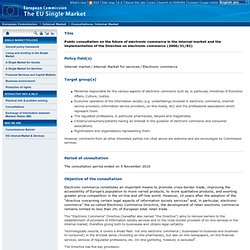
However, 10 years after the adoption of the “directive concerning certain legal aspects of information society services1 and, in particular, electronic commerce” the so-called Electronic Commerce Directive, the development of retail electronic commerce remains limited to less than 2% of European total retail trade. The “Electronic Commerce” Directive (hereafter also named “the Directive”) aims to remove barriers to the establishment of providers of information society services and to the cross-border provision of on-line services in the internal market, therefore giving both to businesses and citizens legal certainty.
The Directive has five key provisions: EU Study on intermed liab. European Commission » Internal Market » Online services » E-Commerce Directive. Introduction of the Directive The Electronic Commerce Directive, adopted in 2000, sets up an Internal Market framework for electronic commerce, which provides legal certainty for business and consumers alike.
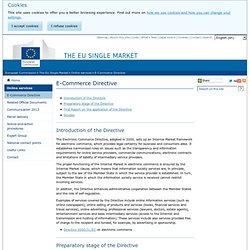
It establishes harmonised rules on issues such as the transparency and information requirements for online service providers, commercial communications, electronic contracts and limitations of liability of intermediary service providers. The proper functioning of the Internal Market in electronic commerce is ensured by the Internal Market clause, which means that information society services are, in principle, subject to the law of the Member State in which the service provider is established.
In turn, the Member State in which the information society service is received cannot restrict incoming services. UGC. Versité du Luxembourg - Media Law.